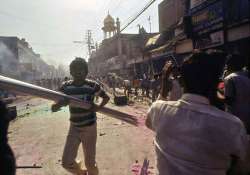SC upholds life sentence to four persons in 1984 anti-Sikh riots
New Delhi, Apr 10: The Supreme Court has upheld the life sentence awarded to four persons for burning two men to death during 1984 anti-Sikh riots.A bench of justices P Sathasivam and M Y Eqbal

New Delhi, Apr 10: The Supreme Court has upheld the life sentence awarded to four persons for burning two men to death during 1984 anti-Sikh riots.
A bench of justices P Sathasivam and M Y Eqbal turned down the plea of the convicts that they could not be held guilty of murder as the body was not recovered by the Delhi police and there was delay in lodging FIR in the case.
"It is well-settled that discovery of dead body of the victim has never been considered as the only mode of proving the corpus delicti (evidence) in murder.
"In fact, there are many cases of such nature like the present one where the discovery of dead body is impossible, specially when members of a particular community were murdered in such a violent mob attack on Sikh community in different places and offenders tried to remove the dead bodies and also looted articles," it said.
The bench upheld the Delhi High Court's order convicting and sentencing Delhi residents Lal Bahadur, Surender P Singh, Ram Lal and Virender Singh to life imprisonment. The High Court had on August 27, 2008 set aside the trial court's order which had acquitted all the four. Ram Lal died in 2011 during the pendency of his appeal in the apex court.
"It is clear that the High Court re-appreciated the evidence of the witnesses in detail and meticulously examined the facts and circumstances of the case in its right perspective and recorded a finding that the prosecution has proved the case against the appellants," the bench said.
The bench also observed that mere variation in statements of a witnesses could not be a ground to discard their testimony as had been done by the trial court in the case.
"It is indeed necessary to note that one hardly comes across a witness whose evidence does not contain some exaggeration or embellishment — sometimes there could even be a deliberate attempt to offer embellishment and sometimes in their over-anxiety they may give a slightly exaggerated account.
"The court can sift the chaff from the grain and find out the truth from the testimony of the witnesses. Total repulsion of the evidence is unnecessary. The evidence is to be considered from the point of view of trustworthiness," the bench said.
A bench of justices P Sathasivam and M Y Eqbal turned down the plea of the convicts that they could not be held guilty of murder as the body was not recovered by the Delhi police and there was delay in lodging FIR in the case.
"It is well-settled that discovery of dead body of the victim has never been considered as the only mode of proving the corpus delicti (evidence) in murder.
"In fact, there are many cases of such nature like the present one where the discovery of dead body is impossible, specially when members of a particular community were murdered in such a violent mob attack on Sikh community in different places and offenders tried to remove the dead bodies and also looted articles," it said.
The bench upheld the Delhi High Court's order convicting and sentencing Delhi residents Lal Bahadur, Surender P Singh, Ram Lal and Virender Singh to life imprisonment. The High Court had on August 27, 2008 set aside the trial court's order which had acquitted all the four. Ram Lal died in 2011 during the pendency of his appeal in the apex court.
"It is clear that the High Court re-appreciated the evidence of the witnesses in detail and meticulously examined the facts and circumstances of the case in its right perspective and recorded a finding that the prosecution has proved the case against the appellants," the bench said.
The bench also observed that mere variation in statements of a witnesses could not be a ground to discard their testimony as had been done by the trial court in the case.
"It is indeed necessary to note that one hardly comes across a witness whose evidence does not contain some exaggeration or embellishment — sometimes there could even be a deliberate attempt to offer embellishment and sometimes in their over-anxiety they may give a slightly exaggerated account.
"The court can sift the chaff from the grain and find out the truth from the testimony of the witnesses. Total repulsion of the evidence is unnecessary. The evidence is to be considered from the point of view of trustworthiness," the bench said.